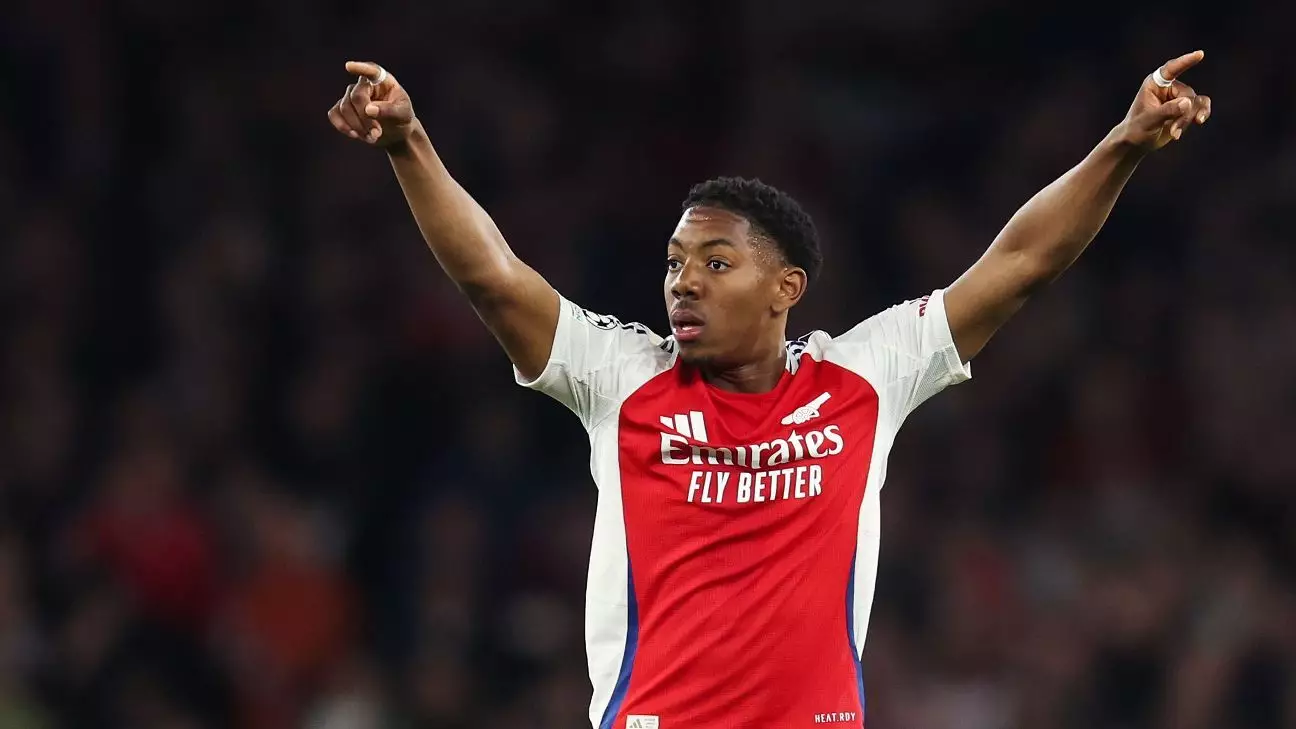In an era where youth development is truly emphasized in football, Myles Lewis-Skelly’s story embodies the triumph of home-grown talent. The Arsenal left-back, who has transitioned into a key player in the Gunners lineup at the tender age of 17, has become a sought-after commodity following a stellar breakout season. His remarkable journey from versatile midfielder in the academy to standout defender highlights not only his adaptability but also Arsenal’s investment in nurturing young talent. Real Madrid’s keen interest in him, as reported by The Guardian, reflects how elite clubs are always on the lookout for the next big thing.
The current state of negotiations concerning Lewis-Skelly’s contract, which is set to expire in 2026, has created a palpable sense of urgency at the Emirates. Reports of stalled discussions create a dilemma for Arsenal; they must accelerate efforts to secure his future, lest they risk losing a generational talent to a rival. A coveted youth product, Lewis-Skelly must now navigate the pressures that come with such high expectations, all while continuing to flourish on the pitch.
Hugo Ekitike: The New Hitman on the Block
As transfer windows open, competition heats up for Eintracht Frankfurt’s Hugo Ekitike, a striker who’s been generating buzz across Europe. With Liverpool reportedly entering the fray, it illustrates the continuing demand for players capable of influencing the game significantly. Ekitike’s impressive record of 33 goal contributions in 47 appearances underlines his ability to thrive in high-pressure environments. Liverpool’s manager, Arne Slot, appears resolute in capturing this talent, despite anticipated competition from Chelsea.
The valuation set by Frankfurt, which is rumored to be around €100 million, will undoubtedly test the resolve of interested parties. Ekitike’s style of play, which blends pace, technical skill, and a sharp tactical mind, is exactly what modern football clubs crave. Yet, one must question the logic of such a high-price tag in a market where flash and talent often surpass utility. Ekitike’s once-in-a-generation ability could indeed justify the expense, but such hefty fees demand immediate returns.
Manchester City’s Strategic Moves
Meanwhile, Manchester City continues to assert their ambition with ongoing negotiations to bring Tijjani Reijnders into their squad. The 26-year-old midfielder’s performance in Serie A last season showcased his capability to resonate with Pep Guardiola’s tactical vision. A “large offer” from City signifies their commitment to ensuring that they remain at the pinnacle of both domestic and European football.
In addition to Reijnders, City’s interest in Nottingham Forest’s Morgan Gibbs-White reveals a broader strategy of investing in versatile players who can adapt quickly. While some may argue that City already boasts a wealth of talent, it is crucial to understand that in football, maintaining competitive depth is essential for sustained success. Guardiola’s penchant for depth illustrates that the Premier League champions are committed to fortifying their roster, ensuring they remain formidable challengers on all fronts.
Real Madrid: A Power Play for Midfield Talent
As Madrid eyes Bayer Leverkusen’s Florian Wirtz, the ramifications reverberate through Europe. The once-expected straightforward transfer to Liverpool now seems uncertain with Xabi Alonso’s recent managerial appointment at Real Madrid. Wirtz’s exceptional skillset, combined with Madrid’s history of pursuing elite talents, underscores the continuous arms race between the top clubs.
The anticipated fee of €100 million for Wirtz encapsulates modern football’s obsession with young stars. However, with inflationary pressures on transfer fees, is it wise to invest so heavily in one player? While Wirtz’s talents could elevate a squad, the risk associated with such expenditures must not be underestimated. Clubs must strike a balance between immediate necessity and long-term vision, and Madrid’s approach thus far hints at a strategic focus on the future.
Emerging Challenges and Tactical Decisions
The transfer landscape is riddled with challenges, from valuations to negotiations, often resembling a high-stakes chess match. Clubs like Bayern Munich are maneuvering to secure promising assets while other Premier League giants such as Chelsea and Manchester United strategize to bolster their squads. As Arsenal looks toward Leroy Sané and other targets, the necessity for calculated, impactful decisions becomes clear.
Every move in this intricate dance can either reinforce a club’s legacy or catalyze a downward spiral into mediocrity. The need for strategic foresight is more urgent than ever, as the lines between success and failure become ever thinner in an increasingly competitive realm. In these high-pressure environments, where millions are at stake, clubs must operate with both ambition and caution, ensuring their sporting and financial futures remain intact.

Leave a Reply